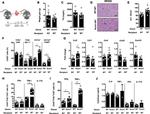Search Thermo Fisher Scientific
Invitrogen
IL-6 Monoclonal Antibody (MP5-32C11), Biotin, Functional Grade, eBioscience™
This Antibody was verified by Cell treatment to ensure that the antibody binds to the antigen stated.
FIGURE: 1 / 8
IL-6 Antibody (36-7062-85) in ELISA








Product Details
36-7062-85
Species Reactivity
Published species
Host/Isotype
Class
Type
Clone
Conjugate
Form
Concentration
Purification
Storage buffer
Contains
Storage conditions
Shipping conditions
RRID
Product Specific Information
Description: The MP5-32C11 antibody reacts with mouse interleukin-6 (IL-6), a 21-28 kDa cytokine secreted by a variety of cell types.
Applications Reported: The Functional Grade Biotin anti-mouse IL-6 antibody (clone MP5-32C11) has been reported for use as the in vivo capture antibody for the In Vivo Cytokine Capture Assay (IVCCA). The IVCCA facilitates measurement of cytokines in serum by increasing their in vivo half lives dramatically. This increases the sensitivity of measurement of in vivo cytokine production 30- to 1000- fold.
For detailed methodology in this application, please refer to Finkelman, F., S. Morris, T. Orekhova, and D. Sehy. 2003. The In Vivo Cytokine Capture Assay for measurement of cytokine production in the mouse. In Current Protocols in Immunology. Unit 6.28. J. Coligan, A. Kruisbeek, D. Margulies, E. Shevach, and W. Strober, eds. John Wiley and Sons, New Yorkz.
Applications Tested: The Functional Grade Biotin MP5-32C11 antibody has been tested by LAL assay to ensure it is free of endotoxin, and has been tested as the detection antibody in a sandwich ELISA for analysis of mouse IL-6 in combination with the purified MP5-20F3 (14-7061) antibody for capture and recombinant mouse IL-6 (14-8061) as the standard.A suitable range of concentrations of the FG Biotin MP5-32C11 antibody for ELISA detection is 0.5-2 µg/mL. A standard curve consisting of doubling dilutions of the recombinant standard over the range of 1000 pg/mL - 8.0 pg/mL should be included in each ELISA plate.
Endotoxin: Less than 0.05 ng/µg antibody as determined by the LAL assay.
Storage and handling: Use in a sterile environment.
Target Information
IL-6 is a gene that encodes a cytokine that plays a role in inflammation and the maturation of B cells. The protein produced by this gene is an endogenous pyrogen that can induce fever in people with autoimmune diseases or infections. The gene is primarily expressed at sites of acute and chronic inflammation, where it is secreted into the serum and induces a transcriptional inflammatory response through interleukin 6 receptor, alpha. The functioning of this gene is implicated in a wide variety of inflammation-associated disease states, including suspectibility to diabetes mellitus and systemic juvenile rheumatoid arthritis. Elevated levels of the encoded protein have been found in virus infections, including COVID-19 (disease caused by SARS-CoV-2). Diseases associated with IL6 include Kaposi Sarcoma and Rheumatoid Arthritis, Systemic Juvenile.
For Research Use Only. Not for use in diagnostic procedures. Not for resale without express authorization.
Bioinformatics
Protein Aliases: B-cell hybridoma growth factor; H-IL-6; IL-6; ILN; Interleukin; Interleukin HP-1; Interleukin-6; Interleukin6; M-IL-6; R-IL-6
Gene Aliases: Il-6; Il6
UniProt ID: (Mouse) P08505
Entrez Gene ID: (Mouse) 16193

Performance Guarantee
If an Invitrogen™ antibody doesn't perform as described on our website or datasheet,we'll replace the product at no cost to you, or provide you with a credit for a future purchase.*
Learn more
We're here to help
Get expert recommendations for common problems or connect directly with an on staff expert for technical assistance related to applications, equipment and general product use.
Contact tech support
